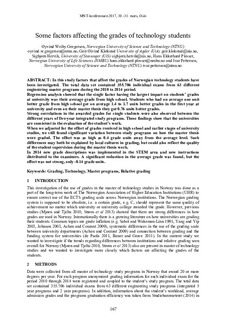Some factors affecting the grades of technology students
Gregersen, Øyvind Weiby; Kløkstad, Geir Øivind; Hervik, Sigbjørn; Plesser, Hans Ekkehard; Pettersen, Ivar
Journal article, Peer reviewed
Published version
Permanent lenke
http://hdl.handle.net/11250/2486986Utgivelsesdato
2017Metadata
Vis full innførselSamlinger
Originalversjon
Nordic Journal of STEM Education. 2017, 1 (1), 167-173.Sammendrag
In this study factors that affect the grades of Norwegian technology students have been investigated. The total data set contained 355.706 individual exams from 63 different engineering master programs during the 2010 to 2014 period. Regression analysis showed that the single factor having the largest impact on students’ grades at university was their average grade from high school. Students who had on average one unit better grade from high school got on average 1.4 to 1.7 units better grades in the first year at university and even on their master thesis they got 0.76 units better grades. Strong correlations in the awarded grades for single students were also observed between the different years of five-year integrated study programs. These findings show that the universities are consistent in the evaluation of the student’s work. When we adjusted for the effect of grades received in high school and earlier stages of university studies, we still found significant variation between study programs on how the master thesis were graded. The effect was as high as 0.4 grade units away from the average level. Such differences may both be explained by local cultures in grading, but could also reflect the quality of the student supervision during the master thesis work. In 2014 new grade descriptions was implemented in the STEM area and new instructions distributed to the examiners. A significant reduction in the average grade was found, but the effect was not strong, only -0.14 grade units.

